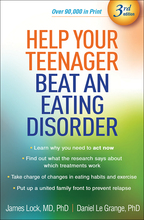Help Your Teenager Beat an Eating Disorder
Third Edition
James Lock and Daniel Le Grange
“The book is of high quality and would be of help to any family facing this difficult situation.”
—Doody's Review Service (on the first edition)
“There are many red flags that parents should recognize when it comes to their adolescent daughter or son's eating habits, and this intelligent book points them out clearly and concisely.”
—Publishers Weekly (on the first edition)
“Drs. Lock and Le Grange are two of the foremost experts in the eating disorders field. The third edition of this book condenses what the authors have learned over decades of working with the families of people with eating disorders—and puts it in a format parents can use.”
—Janet Treasure, PhD, FRCP, FRCPsych, Centre for Research in Eating Disorders, Kings College London, United Kingdom
“This book is essential reading for any parent or family member of a teen with an eating disorder. It’s especially useful for those who have been told to ‘not be the food police’ or that they have no role in helping support a loved one with an eating disorder. It offers practical advice for how to help, along with something just as important: hope.”
—Harriet Brown, author of Brave Girl Eating: A Family’s Struggle with Anorexia
“This book is invaluable for parents, who often feel disempowered and blamed when their child has an eating disorder. It uses straightforward language and realistic, pragmatic examples. The third edition has been updated to incorporate the latest research and incredibly useful practical strategies. I highly recommend this book to all parents of children with eating disorders.”
—Kerri Boutelle, PhD, Professor of Pediatrics, Public Health, and Psychiatry, University of California, San Diego
“The updated third edition of this seminal guide incorporates recent advances in eating disorders research and clinical practice, highlighting the evolving nature of the field and the authors’ commitment to providing respectful, accurate parent education at each step. This book also prepares caregivers to activate family-based treatment quickly and effectively, with implications for a better prognosis. Help Your Teenager Beat an Eating Disorder explains the urgency of these pernicious disorders while reassuring parents that evidence-based interventions exist, and that caregivers are the best, most invested agents of change for their child until symptoms abate.”
—Katharine L. Loeb, PhD, Chicago Center for Evidence Based Treatment
Table of Contents
I. Getting Started: First Steps toward Helping Your Child with an Eating Disorder1. Act Now
2. Get Together
3. Don’t Waste Time on “Why?”
II. Understanding Eating Disorders
4. Know What You’re Dealing With: The Complexity of Eating Disorders
5. Get Into Your Child’s Head: The Distorted Thinking Behind Your Teenager’s Behavior 
6. Understand Your Options: What the Research Says about the Best Ways to Treat Anorexia Nervosa, Bulimia Nervosa, Binge Eating Disorder, and Avoidant/Restrictive Food Intake Disorder
III. Making Treatment Work: How to Solve Everyday Problems to Help Your Child Recover
7. Taking Charge of Change: How to Apply Family Based Treatment to Help with Eating Disorders
8. Playing a Supporting Role: Other Ways You Can Be a Part of Your Child’s Recovery
9. Harnessing the Power of Unity: How to Stay on the Same Page in Your Fight against Eating Disorders
10. Staying Empowered and Informed: How to Work with Professionals Who Are Trying to Help Your Child
Resources
Further Reading
Index
About the Authors
James Lock, MD, PhD, is the Eric Rothenberg, MD, Professor of Child Psychiatry and Pediatrics at Stanford University and Director of the Stanford Child and Adolescent Eating Disorders Program. Dr. Lock is committed to providing evidence-based treatments to children, adolescents, and their families. He is a Distinguished Fellow of the American Psychiatric Association and the American Academy of Child and Adolescent Psychiatry, and a recipient of the Agnes Purcell McGavin Award for Distinguished Career Achievement in Child and Adolescent Psychiatry from the American Psychiatric Association, the Price Family Foundation Award for Research Excellence from the National Eating Disorders Association, the Leadership Award in Research from the Academy of Eating Disorders, and Early and Mid-Career Development Awards from the National Institute of Mental Health.Daniel Le Grange, PhD, is Benioff UCSF Professor in Children’s Health in the Department of Psychiatry and UCSF Weill Institute for Neurosciences and Director of the Eating Disorders Program at the University of California, San Francisco. He is Emeritus Professor at the University of Chicago, where he was Director of the Eating Disorders Program until 2014. Dr. Le Grange was a member of the team at the Maudsley Hospital in London that developed family-based treatment for anorexia nervosa. Over his career, he has treated numerous adolescents and families struggling with eating disorders. He is a recipient of the Leadership Award in Research from the Academy of Eating Disorders and an Early Career Development Award from the National Institute of Mental Health.
Audience
Parents who are concerned about their teen's eating habits or dieting, or who have already received an eating disorder diagnosis. Also of interest to health care professionals working with 10- to 19-year-olds and their families.Previous editions published by Guilford:
Second Edition, © 2015
ISBN: 9781462517480
First Edition, © 2005
ISBN: 9781572309081
